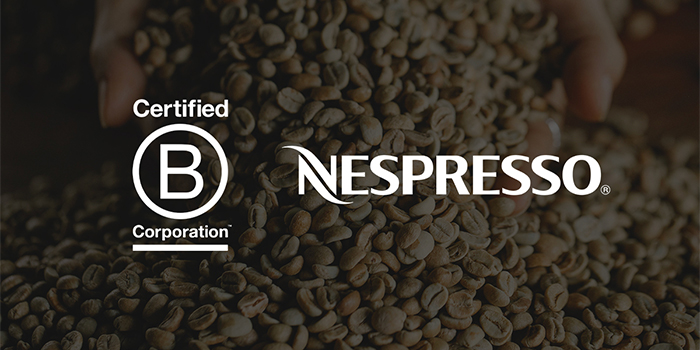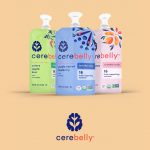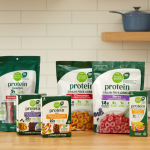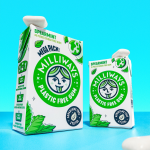As Nespresso Joins, B Corp Faces Questions About “Integrity and Relevance”

When Dean Cycon first heard about B Corp certification in 2006, he was intrigued. As the founder of Dean’s Beans, a Massachusetts-based coffee company dedicated to ethical sourcing and an environmentally friendly production model, Cycon recognized an opportunity for his company to be formally recognized for meeting “high standards of social and environmental performance, accountability, and transparency” as a B Corp certified organization.
Despite feeling that some of B Lab’s assessment criteria was flawed in how it prioritized certain segments of a company’s business practices over others, the self-proclaimed “recovered” human rights attorney ultimately decided to move forward with certification.
“It was more important for me to get on the inside and help develop this thing than it is to stay on the outside and take potshots, which is my usual MO,” he said.
Cycon’s skepticism that the B Corp certification will be able to truly represent the “force for good” that it claims to be has been growing, but, in June, the issue came to the fore after Dean’s Beans – along with 29 other B Corp Certified companies – signed an open letter by watchdog organization Fair World Project that said “the integrity and relevance of B Corp Certification is at risk” after Nespresso Global, the coffee wing of multinational food company Nestle, was awarded use of the seal in April.
The letter says the decision confirms that the B Lab certification process “is in serious need of repair” and accused the multinational coffee company of using the designation to “greenwash its business model and practices.”
“What’s happening with the B Corp is just the latest in a long line: Fair Trade, organics, Rainforest Alliance, you name it,” Cycon told BevNET. “They’ve all gone through this growth and challenge; especially, as these larger corporations seek to paint themselves as socially and ecologically good guys, and they want to know what’s the lowest entry point you can get in?”
The letter calls into question the conflict between B Lab’s stated mission to “build a movement to change our economic system” and the alleged business practices of Nespresso, which has been accused of using child labor, extractive environmental protocols and unfair employment policies. The letter calls for B Lab to strengthen the minimum criteria for certification as well as develop a protocol for holding B Corps accountable for improvement or “face losing their B Corp Certification.”
Is the B Corp Certification Process Flawed?
Of the nearly 5,400 B Corp certified companies, about 590 are categorized as food product and beverage businesses. The certification process centers on a carefully vetted self-assessment where a company answers a set of questions that relate to its business practices in five categories: Governance, Workers, Community, Environment and Customers. Each category has 40 points available; a minimum of 80 points total is required for certification.
To Fair World Project campaign manager Anna Canning, that’s a “low bar for something that calls itself a certification.”
In an editorial for Fair World in May, Canning argued that the assessment criteria “falls short of the basic principles laid out in the United Nations Guiding Principles on Business and Human Rights (UNGPs).” Human rights advocates “have spent years underscoring the inadequacy of B Corp certification to address fundamental human rights,” she wrote.
One of the main complaints of the system is that B Corp applicants can offset lower scores in Environment and Community categories with higher scores in the Worker, Governance and/or Customer categories. But as part of that balancing act, employee wellness programs and customer service initiatives can inflate the positive impact of a company while downplaying failures in human rights, fair trade initiatives and outreach work in poverty-stricken supplier communities. Within that framework, some standard expectations – like health care for workers – might disproportionately mask a company’s other shortcomings in areas like supply chain or environmental initiatives.
Critics also argue that the organization is incentivized to certify more companies and larger corporations because the certification business model is built around revenue from licensing fees.
“There’s definitely a financial incentive…It results in this race to the bottom for ethical standards,” Canning told NOSH. “Certifications with the most licensees have the easiest to meet standards and so for certifications to grow their market share, they will often end up lowering standards to get more participating brands, instead of raising the bar.”
The Fair World open letter lays out specific changes that B Lab can implement to address some of the concerns raised by B Corp certified companies. Most importantly, the letter calls for human rights abuses to be a non-negotiable, disqualifying factor for B Corp certification.
However, that criticism hasn’t resulted in change as of yet. B Lab will not be revoking Nespresso’s B Corp certification, said the company’s senior public relations manager, Alexa Harrison, who noted that the coffee company completed a three-year process to meet the 80 point minimum requirement (Nespresso scored 84 points). Harrison went on to say that B Lab is “currently engaged in a thoughtful multiyear, multi-stakeholder review of the performance requirements for the B Corp Certification to determine how they may need to change to address some of our most pressing global challenges.”
B Lab maintains that the certification is about building a movement and creating a community of member companies that hold each other accountable.
“The B Lab movement’s vision is to transform our economic system to one that benefits all people, communities and the planet, which means being inclusive of a wide range of companies who are at various phases in their impact journey and have shown their commitment to this journey,” Harrison said. “Multinationals like Nespresso have an opportunity to learn from the existing, established B Corps, especially smaller businesses, and vice versa.”
But Nespresso isn’t the only example that has raised hackles. The B Lab has been repeatedly criticized over its inaction when member companies are accused of business practices that run contrary to the organization’s mission statement.
In August 2021, Horizon Organic, a division of Danone North America, abruptly canceled the contracts of 89 Northeastern dairy farmers. When asked for comment, B Lab responded by saying its “certification standards do not restrict a B Corp’s supply chain selections e.g. requiring a certain type of product from a certain type of supplier. Danone North America has been and continues to be a strong advocate for the B Corp movement, and while these decisions could impact a company’s score, it does not affect certification status.”
Meanwhile, B Lab remained silent when Teamsters Local 665 asked for comment on Amy’s Kitchen’s union busting actions and history of OSHA violations.
B Corp Certification Gaining Momentum
These complaints don’t seem to be reducing the number of companies going through the certification process: About 100 food and beverage companies have been certified in 2022 alone. Juice company Uncle Matt’s Organic, Helalia Vanilla and Groundwork Coffee all recently joined the ranks of B Corp Certified companies.
“Having recently gone through the process of verification, we are confident that the standards are being upheld. Certification doesn’t just prove where companies excel now — it also commits companies to their mission for the long term,” said Jessica Smith, Vice President of Groundwork Coffee. “From our perspective the standards were high, and the verification requires that all companies recertify every three years to ensure integrity remains!”
Critics argue that the recertification process is important, but B Lab should hold companies accountable if they do not improve their previous scores or receive lower scores than their previous rating.
Founder and CEO Maria Uspenski got her company Tea Spot certified as B Corp in 2011 and has seen B Lab grow over the years. She said that Nespresso’s size and reach in the coffee industry allows it to enact change on a massive scale if it chooses to prioritize B Lab’s stated goals in its business practices.
“If they’re making that statement, if they’re going in that direction, if they’re truly trying to do something legitimate – let’s say make all their capsules compostable or biodegradable – then that’s a huge impact. And that’s a very, very positive thing,” she said. “On the other hand, there are just some massive contradictions and it essentially slaps in the face of what B Corps stand for…Anyone can work any algorithm, to make things work out to get certified as a B Corp.”
For Dean Cycon, the current situation reminds him of when Fair Trade USA split from Fair Trade International in 2011, with many members leaving the former group because it had “dumbed down” its standards.
“This is the first crack in the wall that started to make it look like every other certification scheme that ultimately gets captured by organizations that want to use it, not learn from it,” he said. “It’s quite sad because at the end of the day, the people at the end of the supply chain and the environment suffer. And the customer gets a false impression about what’s being done in his (or her) name with her (or his) money.”














![[Updated] Oats Overnights Secures $45M Investment From Astō](https://d2azl42aua8mom.cloudfront.net/wp-content/uploads/2026/01/29172259/2026-01-29-oats-overnights-secures-45m-in-growth-equity-from-square-150x150.jpg)

